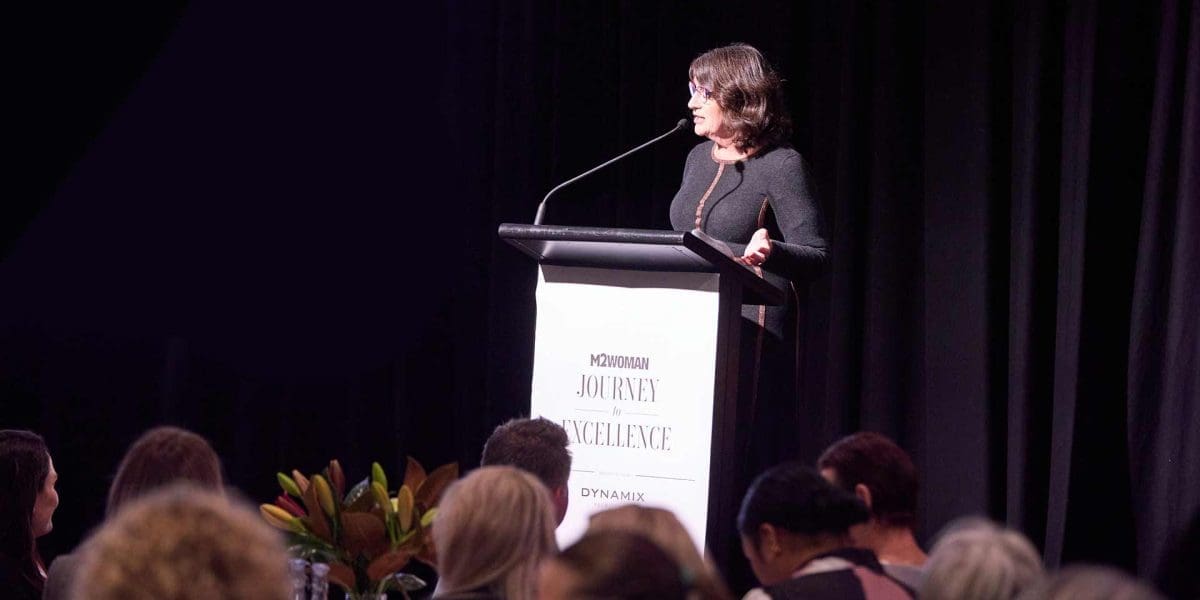How To Become A C-Suite Leader
Naomi Ballantyne – Defining C-Suite Leadership with Substance Over Status
She opened with humour. “I’m retired, so this might be my last chance to speak to an audience like this before Chat GTP takes over from me,” she said. “I am also grateful for the chance to get out of jeans and knits for the first time in a long time.”
Her rise to the top was anything but slow. “I became the Chief Operating Officer of Sovereign Assurance at the age of 28,” she said. “It was the largest life insurance company in New Zealand at the time. I think I can still remember what it took to get there.”
One of her first messages was about the illusion of titles. “Titles do not denote the power or the influence or the worth of a role. A chief role in a ten-person business might not be more valuable than a general manager in a large global company. If you just want the title because you want to be paid more, then maybe a better route is to move to a more valuable company.”
She reminded the audience that before thinking about what you want to be in the workplace, you must answer a bigger question. “Decide who you want to be when you get there. What are your values that you will not compromise on? How will you treat people? How will you behave when you are presented with a moral dilemma?”
Naomi spoke about the pressures that executives face. “Office politics, incentive schemes, peer competition, shareholder demands… they can all lead to ethical dilemmas that are easy to give into if you have not already ruled them out of your life.” She added that at the end of your career “it will not be those shareholders or those political colleagues who mourn you the most.”
Passion, she said, is non-negotiable. “Passion for the industry you are in and the value it provides to society. Passion for the business you are in and the role it plays in leading that industry value. And passion for the people in your business who make that happen.” For her, that meant expecting her team to see themselves as “life insurance people first and then technical experts second.”
She stressed the importance of knowledge, curiosity and humility. “Knowledge is not power if you just hold onto it. Sharing your knowledge, that’s power.” And on curiosity, “A willingness to learn about other parts of the business outside of your own technical expertise is enormously important.”
Debate, she said, should be embraced, not feared. “Debate about something is not a personal attack on your knowledge or experience. The good of the business trumps the needs of the individual to be seen to have been right.” She warned against rushing out of a meeting and undermining a collective decision. “You are destroying the culture. Not the decision itself, the behaviour around it.”
Her metaphor for the CEO role was vivid. “A CEO is just the conductor of the orchestra. They have to know what each instrument does, when they should be played, and how to bring them together to deliver beautiful cohesiveness. And when an individual performer is having an off day, they have to help them fix that.”
For Naomi, all executive decisions come back to two questions. “How does this decision impact on our customers? And how does it impact on our staff? Those two questions, considered across every discipline of the business, are what drive competitiveness and culture.”
Naomi Ballantyne has built three of the largest life insurance companies in New Zealand, sold a billion-dollar business, and hired and developed hundreds of leaders along the way. At the M2woman Journey to Excellence event, she stepped on stage with the kind of perspective that only comes from decades of leading at the top, and she did not shy away from sharing it.
- Action Points from Naomi Ballantyne’s Keynote
- Define your values before you chase the title.
- Look at the scale and substance of a role, not just the name.
- Lead with passion for your industry, your business and your people.
- Share your expertise with grace.
- Stay curious about the whole business.
- Debate ideas without ego and respect collective decisions.
- Think like a CEO to broaden decision-making strength.
- Always check decisions against their impact on customers and staff.
